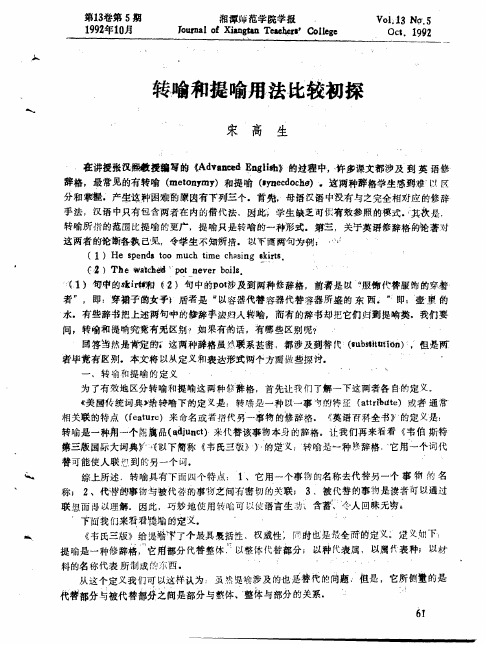修辞格“转喻”与“提喻”的区别
- 格式:ppt
- 大小:1.63 MB
- 文档页数:36

转喻和提喻的区别转喻(metonymy)提喻(synecdoche) 修辞手法都属于关系类修辞,他们的共同之处都是用某一事物的名称指代另一事物的名称。
目前国内有关英语修辞的教科书中就常将这两种修辞手法混为一谈,使老师和学生对此模糊不清。
其实,如果将这两种修辞手法的定义和用法弄清,就不难区分了。
下面就这两种修辞手法的定义、用法以及它们之间的异同做些比较。
1.转喻的定义与用法用某一事物的名称代替另一事物的名称的修辞手法叫做转喻或借代。
这两种事物之间有着密切相关的联系。
转喻通常用下列几种方式指代。
(1)根据人名或商品品牌名:Uncle Sam(山姆大叔)——Americans or the American government(美国人/美国政府)John Bull(约翰牛)——the English nation or a typical Englishman(英国/地道英国人)He is reading Shakespeare. 他在读莎士比亚作品(Shakespeare’s works 用作者指代作品)He went in debt just to keep up with the Joneses.他为了玉邻里攀比而负债。
(Joneses :neighbors 用“琼斯家”指代“邻里”)(2)根据实物名称Finally she married money. 她最终嫁给了有钱人。
(a rich man用“钱”指代“有钱人”)I live near an airport and passing planes can be heard night and day.我住在飞机场附近,日夜可听到过往的飞机声。
(the noise made by passing planes用“过往的飞机”指代“噪音”)(3)根据动植物名称The big apple(大苹果)——New York city(纽约市)Russian bear(俄国熊)——Russians or the Russian government(俄国/俄国政府)British lion(英国狮)——England or the English government(英国/英国政府)The flower of the nation was sent off to war.该国的壮小伙子都被送去打仗了。


转喻法(metonymy)提喻法(synecdoche) 和换称(antonomasia)讲解及举例对比分析转喻(metonymy)提喻(synecdoche) 换称(antonomasia)这三种修辞手法都属于关系类修辞,他们的共同之处都是用某一事物的名称指代另一事物的名称。
目前国内有关英语修辞的教科书中就常将这三种修辞手法混为一谈,使老师和学生对此模糊不清。
其实,如果将这三种修辞手法的定义和用法弄清,就不难区分了。
下面就这三种修辞手法的定义、用法以及它们之间的异同做些比较。
1.转喻的定义与用法用某一事物的名称代替另一事物的名称的修辞手法叫做转喻或借代。
这两种事物之间有着密切相关的联系。
转喻通常用下列几种方式指代。
(1)根据人名或商品品牌名:Uncle Sam(山姆大叔)——Americans or the Americangovernment(美国人/美国政府)John Bull(约翰牛)——the English nation or a typical Englishman(英国/地道英国人)He is reading Shakespeare. 他在读莎士比亚作品(Shakespeare’s works 用作者指代作品)He went in debt just to keep up with the Joneses.他为了玉邻里攀比而负债。
(Joneses :neighbors用“琼斯家”指代“邻里”)We drove a Ford to Hyde Park. 我们驾驶一辆福特牌小轿车到海德公园去。
(Ford :a car whose make is Ford 用品牌名指代实物)(2)根据实物名称Finally she married money. 她最终嫁给了有钱人。
(a rich man用“钱”指代“有钱人”)I live near an airport and passing planes can be heard night and day.我住在飞机场附近,日夜可听到过往的飞机声。


转喻法提喻法和换称等的例句和区别转喻法(metonymy)提喻法(synecdoche) 和换称(antonomasia)讲解及举例对比分析转喻(metonymy)提喻(synecdoche) 换称(antonomasia)这三种修辞手法都属于关系类修辞,他们的共同之处都是用某一事物的名称指代另一事物的名称。
目前国有关英语修辞的教科书中就常将这三种修辞手法混为一谈,使老师和学生对此模糊不清。
其实,如果将这三种修辞手法的定义和用法弄清,就不难区分了。
下面就这三种修辞手法的定义、用法以及它们之间的异同做些比较。
1.转喻的定义与用法用某一事物的名称代替另一事物的名称的修辞手法叫做转喻或借代。
这两种事物之间有着密切相关的联系。
转喻通常用下列几种方式指代。
(1)根据人名或商品品牌名:Uncle Sam(山姆大叔)——Americans or the Americangovernment(美国人/美国政府)John Bull(约翰牛)——the English nation or a typical Englishman(英国/地道英国人)He is reading Shakespeare. 他在读莎士比亚作品(Shakespeare’s works 用作者指代作品)He went in debt just to keep up with the Joneses.他为了玉邻里攀比而负债。
(Joneses :neighbors用“琼斯家”指代“邻里”)We drove a Ford to Hyde Park. 我们驾驶一辆福特牌小轿车到海德公园去。
(Ford :a car whose make is Ford 用品牌名指代实物)(2)根据实物名称Finally she married money. 她最终嫁给了有钱人。
(a rich man用“钱”指代“有钱人”)I live near an airport and passing planes can be heard night and day.我住在飞机场附近,日夜可听到过往的飞机声。

转喻法(metony my)提喻法(synecd oche)和换称(antono masia)讲解及举例对比分析转喻(metony my)提喻(synecd oche)换称(antono masia)这三种修辞手法都属于关系类修辞,他们的共同之处都是用某一事物的名称指代另一事物的名称。
目前国内有关英语修辞的教科书中就常将这三种修辞手法混为一谈,使老师和学生对此模糊不清。
其实,如果将这三种修辞手法的定义和用法弄清,就不难区分了。
下面就这三种修辞手法的定义、用法以及它们之间的异同做些比较。
1.转喻的定义与用法用某一事物的名称代替另一事物的名称的修辞手法叫做转喻或借代。
这两种事物之间有着密切相关的联系。
转喻通常用下列几种方式指代。
(1)根据人名或商品品牌名:UncleSam(山姆大叔)——Americ ans or the Americ an govern ment(美国人/美国政府)John Bull(约翰牛)——the Englis h nation or a typica l Englis hman(英国/地道英国人)He is readin g Shakes peare. 他在读莎士比亚作品(Shakes peare’sworks用作者指代作品)He went in debt just to keep up with the Jonese s.他为了玉邻里攀比而负债。
(Jonese s :neighb ors 用“琼斯家”指代“邻里”)We drovea Ford to Hyde Park. 我们驾驶一辆福特牌小轿车到海德公园去。
(Ford :a car whosemake is Ford 用品牌名指代实物)(2)根据实物名称Finall y she marrie d money.她最终嫁给了有钱人。
THE COMPARISON BETWEEN METONYMY,SYNECDOCHE AND ANTONOMASIA转喻、提喻、换称三种修辞手法的对比转喻(Metonymy)、提喻(synecdoche)、换称(antonomasia)这三种修辞手法都属于关系类修辞,它们的共同之处都是用某一事物的名称指代另一事物的名称,故而常常容易使人混淆。
目前国内有关英语修辞的教科书中就常将这三种修辞手法混为一谈,使得老师和学生对此模糊不清。
其实,如果将这三种修辞手法的定义和用法弄清,就不难区分它们。
下面就这三种修辞手法的定义、用法以及它们之间的异同等作些比较:一.转喻(Metonymy)的定义与用法:1.定义:用某一事物的名称代替另一事物的名称的修辞手法叫做转喻或借代。
这两种事物之间有着密切相关的联系。
(A metonymy is a figure of speech that has to do with the substitution of the name of one thing for that of another with which it is closely associated.)2.用法:转喻通常用下列几种方式指代:①根据人名或商品品牌名:Uncle Sam(山姆大叔)→Americans or the American government(美国人/美国政府)John Bull(约翰牛)→the English nation or a typical Englishman(英国/地道英国人)He is reading Shakespeare. 他在读莎士比亚作品。
Shakespeare's works (用作者指代作品)He went in debt just to keep up with the Joneses. 他为了与邻里攀比而负债。
neighbours(用“琼斯家”指代“邻里”)We drove a Ford to Hyde Park. 我们驾驶一辆福特牌小轿车到海德公园去。
THE COMPARISON BETWEEN METONYMY,SYNECDOCHE AND ANTONOMASIA转喻、提喻、换称三种修辞手法的对比转喻(Metonymy)、提喻(synecdoche)、换称(antonomasia)这三种修辞手法都属于关系类修辞,它们的共同之处都是用某一事物的名称指代另一事物的名称,故而常常容易使人混淆。
目前国内有关英语修辞的教科书中就常将这三种修辞手法混为一谈,使得老师和学生对此模糊不清。
其实,如果将这三种修辞手法的定义和用法弄清,就不难区分它们。
下面就这三种修辞手法的定义、用法以及它们之间的异同等作些比较:一.转喻(Metonymy)的定义与用法:1.定义:用某一事物的名称代替另一事物的名称的修辞手法叫做转喻或借代。
这两种事物之间有着密切相关的联系。
(A metonymy is a figure of speech that has to do with the substitution of the name of one thing for that of another with which it is closely associated.)2.用法:转喻通常用下列几种方式指代:①根据人名或商品品牌名:Uncle Sam(山姆大叔)→Americans or the American government(美国人/美国政府)John Bull(约翰牛)→the English nation or a typical Englishman(英国/地道英国人)He is reading Shakespeare. 他在读莎士比亚作品。
Shakespeare's works (用作者指代作品)He went in debt just to keep up with the Joneses. 他为了与邻里攀比而负债。
neighbours(用“琼斯家”指代“邻里”)We drove a Ford to Hyde Park. 我们驾驶一辆福特牌小轿车到海德公园去。
提喻和转喻的区别例子
以下是 6 条关于提喻和转喻的区别例子:
1. 咱就说,提喻是用局部来代表整体,比如“帆”来指代“船”,这就像用一个人的眼睛来代表这个人一样神奇呀!而转喻呢,是用一个密切相关的事物来代表另一个,像用“王冠”代表“国王”,不就跟用一个人的帽子来暗示这个人差不多嘛。
2. 你看哈,提喻会用“白发”表示“老人”,这多有意思呀!但转喻呢,会拿“白宫”来说“美国政府”,这不就像是用家里的客厅来代表整个家一样嘛。
3. 哎呀呀,提喻可以用“手”指代“工人”,这不是很巧妙嘛!那转喻就是用“笔杆子”指代“作家”,这感觉就像是用作家手里的工具来代表作家本人一样呢。
4. 喂喂喂,提喻会拿“花朵”来象征“美丽的少女”呀,多形象!而转喻是用“橄榄枝”来表示“和平”,不就跟用一个特定的东西来暗示一种抽象概念差不多嘛。
5. 嘿哟,提喻用“面包”指代“食物”,这多直接!但转喻呢,会用“娱乐圈”指代“所有娱乐圈的人”,就好像用一个圈子来包含圈内的所有人一样呢。
6. 哇塞,提喻可以用“车轮”表示“车”,好神奇诶!转喻则是用“华尔街”来指代“美国金融界”,这不就像是用一条街来概括一个行业嘛。
总之呢,提喻和转喻区别还是很大的呀,一个是局部与整体或象征关系,一个是密切相关事物的指代,得好好区分才行呢!。